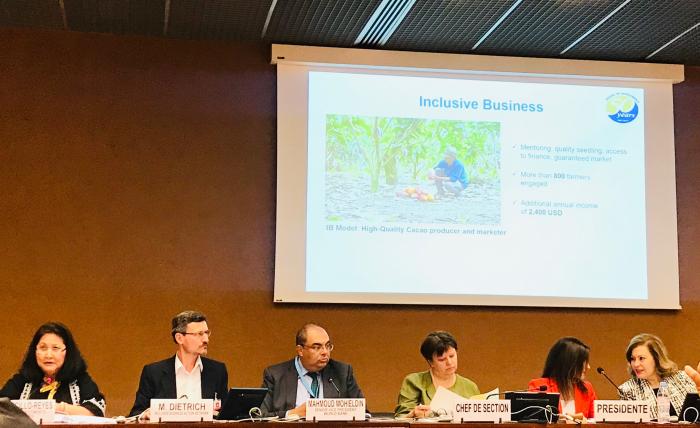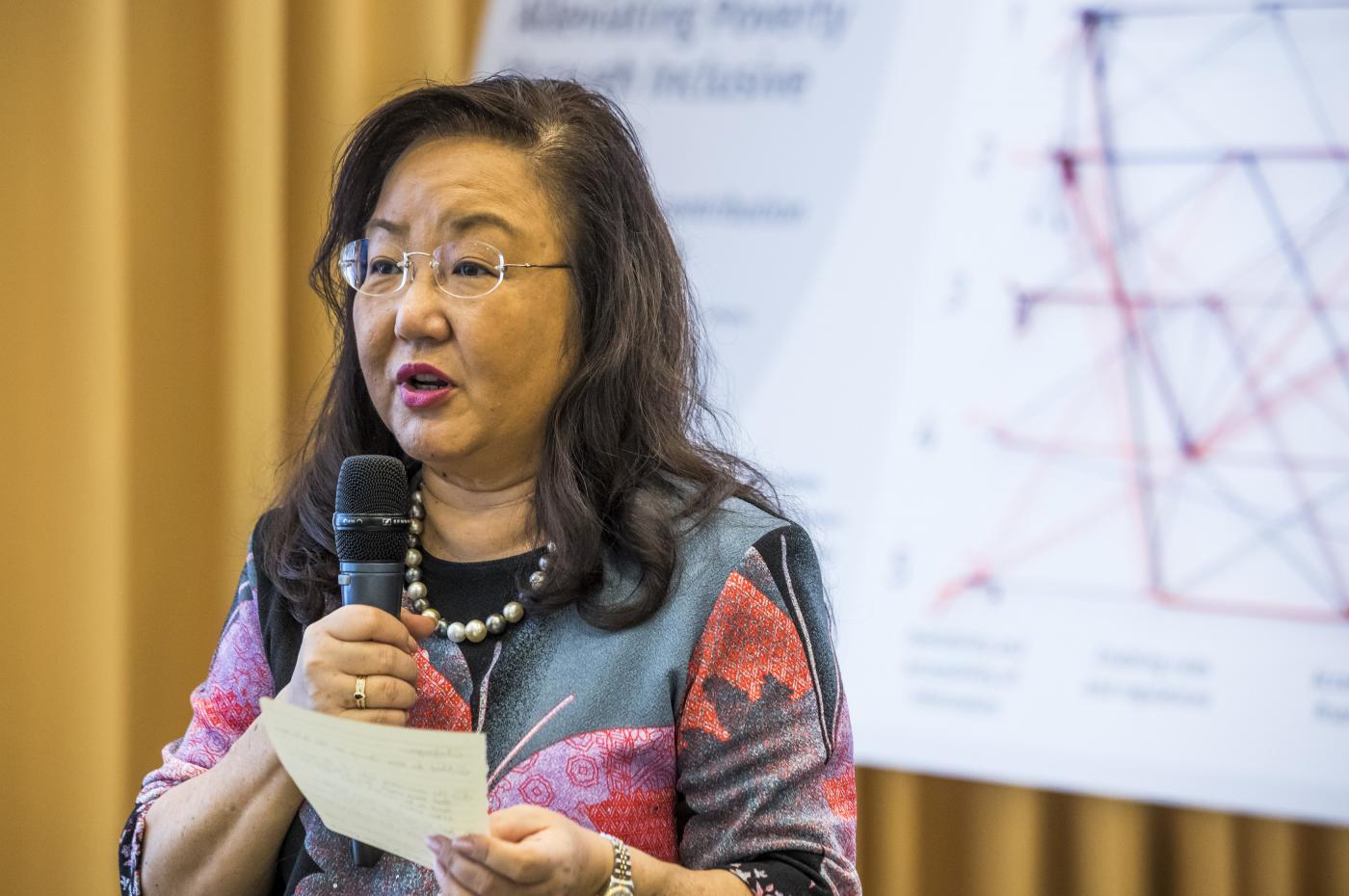Highlights
iBAN’s Policy Development Programme, which began in June 2018, is anchored to the ASEAN Strategic Action Plan for SME Development (SAP SMED 2025). Top-level endorsement from ASEAN provided the necessary backing for the policymakers from the 10 member states to begin a process of national IB strategy development
In Cambodia, Vietnam and Malaysia, the Programme focuses on facilitating landscape studies mapping existing businesses and enabling policies. In the Philippines, a policy advisory initiative has been launched. The landscaping process is raising awareness of IB among high level policymakers and the business and impact investor community
Peer to peer exchanges at fora and discussions have provided some of the most impactful feedback. Each country follows its own IB policy development journey based on national context, which provides ample opportunity for insightful peer learning
Through the Programme, a blueprint for developing IB policy has emerged. iBAN aims to maximize social impact by successfully replicating its IB Policy Development Programme in other regions, particularly Africa. By learning from the ASEAN experience, other regions can draw on successful models to support inclusive businesses
Inclusive business (IB) is good business. With 4.5 billion people living at the base of the economic pyramid (BOP), it represents an estimated market opportunity of five trillion US dollars per year. Inclusive business is a private sector approach to providing goods, services, and livelihoods on a commercially viable basis, either at scale or scalable, to people at the BOP. Companies with an inclusive business approach pursue market opportunities. They integrate people at the base of the pyramid into their value chains either as customers, suppliers (i.e. smallholder farmers), distributors, or retailers (i.e. micro-entrepreneurs, small mom-and-pop-shops).

Smallholder farmers are one example of people at the BOP being incorporated into value chains as suppliers. Photo Credit: Sasin Tipchai on Pixabay
“Inclusive business models build bridges between business and the poor for mutual benefit,” as aptly stated in the United Nations Report “Creating Value for All: Strategies for Doing Business with the Poor (2008).”
Despite the benefits of inclusive business, entrepreneurs are hampered by barriers along four dimensions: inefficient regulations, lack of information about markets, lack of access to capital and lack of capacity. In order to foster inclusive businesses and provide a place for them to thrive, the right enabling environment must be in place. Governments can encourage inclusive businesses to emerge through specific policy instruments targeting all four dimensions.
Governments and international organizations are recognising and prioritising inclusive business as a means of economic development and social impact. In 2017, the Association of Southeast Asian Nations (ASEAN) declared its commitment to IB through the Chairman’s statement.
Chairman’s statement ASEAN Summit 2017
This statement provided the impetus for iBAN to develop its flagship IB Policy Development Programme in collaboration with the ASEAN Coordinating Committee for Micro Small and Medium Enterprises (ACCMSME) and the ASEAN Secretariat. The Programme, which commenced in June 2018, is anchored to the ASEAN Strategic Action Plan for SME Development (SAP SMED 2025), with the objective of strengthening the capacities of senior policymakers to develop policy instruments that promote inclusive business. These instruments range from tax incentives to innovative social bonds. In addition, iBAN supports key stakeholders in ASEAN, including policymakers, companies and investors, through separate programmes with partners on impact investment matching (avpn) and business model development (Grow Asia) in a comprehensive regional approach.
The Programme is working closely with 20 policymakers representing the 10 ASEAN member states, who are participating in an 18-month programme that includes:
- three IB Policy Forums culminating in a regional IB Summit;
- national policy development through IB landscaping and policy advisory in collaboration with the United Nations Economic and Social Commission for Asia and the Pacific (UNESCAP);
- public private dialogues;
- company visits; and
- webinars
Each member state was at a different stage in its IB journey when the Policy Development Programme commenced. The Philippines already had an IB policy in place. The Board of Investment (BoI) listed IB models as a preferred activity in 2017. Projects in the agribusiness and tourism sectors that target micro and small enterprises (MSEs) as part of their value chain are eligible for registration. If they qualify for BoI Pioneer status, they are entitled to a five-year tax holiday. The programme has specific requirements; for example, agribusinesses must employ at least 300 farmers or suppliers. They must also provide technical assistance, capacity building and access to finance.

Agribusiness is one of the Policy Development Programme's focus areas. Photo Credit: Sasin Tipchai on Pixabay
Felicitas Agoncillo-Reyes, Assistant Secretary for Investments Promotion at the Philippine Board of Investments
The Philippines represents one example of the development of an enabling policy environment for Inclusive Business. Initiatives of the same scale are now taking place in Cambodia, Vietnam and Malaysia. The regional policy programme and peer support have encouraged governments to strengthen their respective national IB policy development initiatives, which iBAN supports in collaboration with UNESCAP.
In Cambodia, Vietnam and Malaysia, the Programme focuses on facilitating landscape studies mapping existing businesses and enabling policies. In the Philippines, a policy advisory initiative has been launched. The landscaping process is raising awareness of IB among high level policymakers and the business and impact investor community. In Cambodia, the Ministry of Industry and Handicrafts is taking the lead to develop the “Inclusive Business enabling environment for Cambodia (IBeeC)” strategy and include IB in its national development plans. In Vietnam, the focus is on IB accreditation at the provincial and national levels. Malaysia seeks to expand its social enterprise promotion policies towards IB based on the findings of the landscaping, in order to support the bottom 40% (B40) of the population. The Philippines is working towards the implementation of its national IB promotion strategy on a provincial level and expanding the scope of its tax incentives policy to include new sectors.
Through the Programme, a blueprint for developing IB policy has emerged, encompassing:
Raising awareness among key stakeholders, notably government and business associations
Establishing focal points in key stakeholder organizations
Creating a public-private accreditation system
Including pro-poor targets in public procurement
Offering tax and other financial incentives
Developing financial instruments for impact investing
Providing technical assistance to key stakeholders for IB promotion
Developing monitoring and reporting tools and systems
Policymakers in each country work towards developing national level IB Action Plans, which often integrate enabling policies into existing policy frameworks, such as national medium-term development plans. At the regional level, the Programme has found it beneficial to anchor IB policies in the regional ASEAN Strategic Action Plan on Small and Medium Enterprise development. Inclusive Business remains high on the agenda of the ASEAN leaders who agreed in June 2019 to “support the conduct of inclusive business in ASEAN; through business models and practices that address the needs of and generate opportunities for all” in the ASEAN Leaders’ Vision Statement on Partnership for Sustainability.
The Programme also works to strengthen peer learning and public private dialogue on IB in the region in order to encourage partnership and replication of IB initiatives. Policymakers share lessons learned and case studies during the forums and summits. They present and receive feedback on their national IB action plans, and benefit from connections to businesses and impact investors. Private sector representatives such as the ASEAN Business Advisory Council and other stakeholder groups are invited to the forums, the IB Summit and webinars to provide their insights into barriers that should be addressed through policy actions.

Policymakers and experts at an IB policy meeting. Photo Credit: UNCTAD/Amy Shelver

Policymakers sharing lessons learned to improve IB policies. Photo Credit: iBAN
1. Development of IB policy strategies: From regional to national level and back
The top-level regional endorsement from ASEAN provided the necessary backing for the policymakers from the 10 member states to begin a process of national IB strategy development.
2. Anchoring IB policy development on existing institutions and strategic action plans
Utilising the ASEAN Strategic Action Plan for SME Development (SAPS MED 2025) as a foundation positioned IB as a valuable contribution to the SME development agenda, which is very powerful in ASEAN.
3. Peer learning is powerful
Peer to peer exchanges during the fora and subsequent bi-lateral discussions have provided some of the most impactful feedback. Each country follows its journey on IB policy development based on specific national contexts, which provides ample opportunity for insightful peer exchanges.
4. Public Private Policy Dialogue is key to developing IB policies
Emphasis on national and regional PPPDs with companies and investors also working with iBAN has proven to be effective.
Based on the experience in ASEAN, iBAN aims to maximise social impact by successfully replicating its IB Policy Development Programme in other regions, particularly Africa. The United Nations Conference on Trade and Development (UNCTAD) Multi-Year Expert Meeting held June 17-19 in Geneva focused on how the sustainable and inclusive dimension of enterprise development could be enhanced by promoting responsible business practices and inclusive entrepreneurship to facilitate progress towards the implementation of the 2030 Agenda for Sustainable Development. iBAN’s Director for Asia and Policy, Markus Dietrich, spoke at the event and highlighted lessons learned from the Programme in the ASEAN context. He emphasised the importance of a South-South dialogue in promoting a policy environment that supports inclusive business and social impact.
Felicitas Agoncillo-Reyes, Assistant Secretary for Investment Promotion at the Philippine Board of Investment and ASEAN IB champion, facilitated a South-South dialogue at the meeting with policymakers from Africa and international organizations. She shared her insights and experiences with IB policy development. iBAN also provided information on support available for countries to improve their IB policy environment. By learning from the ASEAN experience, other regions can draw on successful models to support inclusive businesses. The expansion of these models has great potential to drive innovations, strengthen supply chains and provide crucial services and greater empowerment for the poor.





